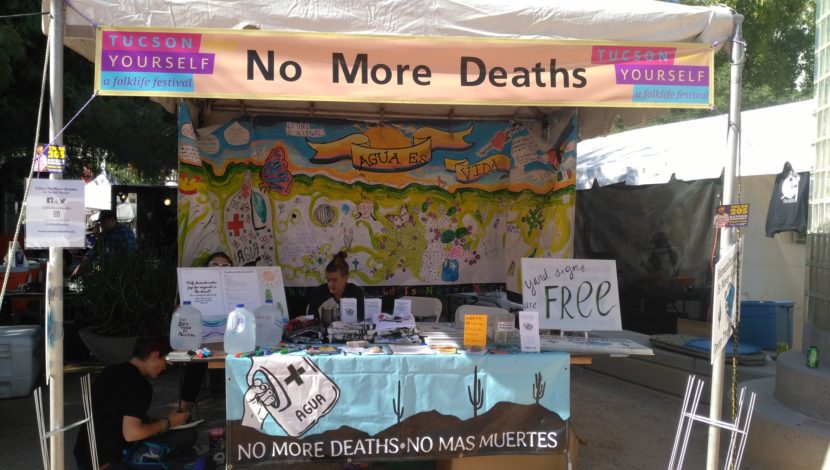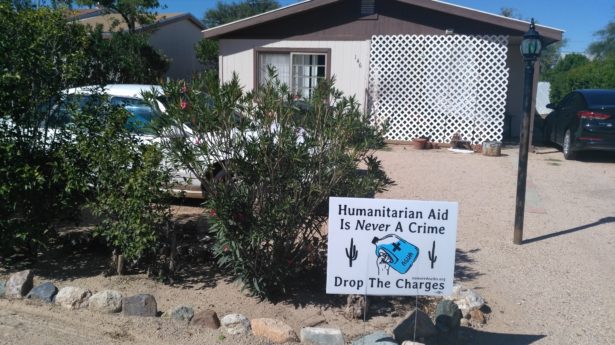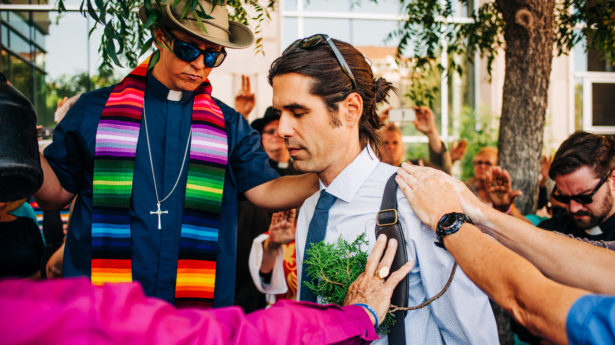The Unitarian Universalist Service Committee advances human rights through grassroots collaborations.
“Agua es Vida” (Water is Life): Reflections on Volunteering with No More Deaths – Part 2

By Rev. Connie Yost on November 18, 2019
Recently, Reverend Connie Yost of the First Unitarian Church, Portland, served in a special envoy to raise public awareness around the retrial of No More Deaths activist Scott Warren. This is the account of her experience. Part one of this story can be found here.
Part 2
Our volunteer group spent a weekend in Douglas, a small town on the border with Agua Prieta, Sonora, Mexico, southeast of Tucson. We met Pastor Mark and Sister Judy who work with Frontera de Cristo, a bi-national organization that builds relationships and understanding across borders and seeks to respond in faith and not fear to the realities of immigration. Along with a group of Presbyterians from Longmont, Colorado, we drove and walked along various sections of the border wall, learning about the history of the Douglas-Agua Prieta community before and after the militarization of the border. In fact, the 12 miles of 18-foot tall border wall with four rows of concertina wire on it was built in 2012, with wire added just this year. A recent article in the Arizona Daily News says that the lower post-and-rail fencing that extends beyond the tall fence will soon be replaced by a 30-foot wall. Money for the new wall was diverted from anti-narcotics funds even though drug seizures show strikingly more hard drugs are being smuggled at ports of entry than through the desert where the wall is being built.
In addition to reinforcing the wall along the Douglas border, there are also many more agents. Our guide explained that in 1990, there were 15 border patrol agents in Douglas; now there are 600. We stood on a hill where the tall fencing changed to lower fencing in front of a border patrol agent sitting in his idling truck. There is a memorial shrine dedicated to Carlos LaMadrid, a 19-year-old father and U.S. citizen, running away with drugs, who was shot in 2011 by a border agent while he tried to scale the wall on the U.S. side. He later died at the hospital. In 2016, a U.S. district judge ruled that the border agent was not liable for the death.
All of us volunteers had brought our passports, so we were able to walk across the border—no one checked our passport or even looked at us—and went to the office of the humanitarian aid group in Agua Prieta, which assists migrant asylum-seekers who are living in the tent city erected a block away on the border fence. We learned that only the first 10 asylum-seekers are in the tent city; the rest of the estimated 650 migrants on the Mexican side are in shelters or living somewhere in the city, and another 650 asylum-seekers are on the U.S. side awaiting their court hearing. In Tucson, we heard that when our government said there were no more shelter beds in the U.S., Tucson had empty beds.
We learned that the dangers for asylum-seekers in Mexico are real. The drug cartels figured out that migrants are easy prey and have taken over the bus station where migrants arrive, demanding $500 payment before they would let them leave. Now, migrants taxi in or make other arrangements to get to Agua Prieta.
The aid group in Agua Prieta works with local churches on both sides of the border to provide three meals a day to the migrants living in the tent city. The migrants come to the aid office to get their meals, go to the bathroom and take showers. The situation is so dangerous with the drug cartels and some police working with them, that the migrants have to be escorted the one block to the office and back. For their trouble, the aid workers are receiving death threats. A fervent plea was made to us for more U.S. volunteers to help in Agua Prieta with the accompaniment, as the cartels won’t mess around with U.S. citizens. I am working with our interfaith immigrant justice group here in Portland, Oregon, to get more volunteers down there.
Throughout my volunteer time, I came back to those words in Matthew 25 which tell us clearly that our mandate is to help the stranger and those who are in distress. Each person has a spark of divinity which we honor when we treat everyone with dignity, respect, kindness, and care. It is unconscionable that our laws are designed to harm and traumatize those who seek asylum with us, and leaves already vulnerable persons in even more dangerous situations. It is not a broken system; it is an inhumane system. I can’t imagine a jury that would convict Scott Warren of felony charges, which could carry a sentence of up to 10 years in prison, for doing what any person of conscience would do. But even if he is convicted, would that stop us from doing what we know is right? We know that it won’t, and for that I am grateful.
I finished my volunteer time tabling at the Tucson Meet Yourself festival, which was started in 1974 as a way to celebrate and present the living traditional arts and expressions of everyday life of the folk and ethnic communities of the multi-national Arizona-Sonora region.
My young companion volunteer, Emma, and I were able to give away lots of yard signs and people wrote encouraging words in various languages on plastic gallon jugs of water. Just as our shift was ending, a young man approached me and noted the sign that said, “Agua es Vida” or “Water is Life.” He said that he was a Hopi Indian, and that, “we have always known that water equals life.” Emma asked him to write Water is Life in Hopi for us on the sign. He did, and we chatted a little about his life on the reservation. “You see,” he said as we were leaving, “young people do have things to teach elders.”
It was a fitting end to my time in the desert, not only as an elder among young adults, but as a sojourner among sojourners, doing what I can, and feeling so much gratitude for all who help those in such desperate need.
Photo Credit: Rev. Connie Yost
***
About UUSC: Guided by the belief that all people have inherent worth and dignity, UUSC advances human rights globally by partnering with affected communities who are confronting injustice, mobilizing to challenge oppressive systems, and inspiring and sustaining spiritually grounded activism for justice. We invite you to join us in this journey toward realizing a better future!

